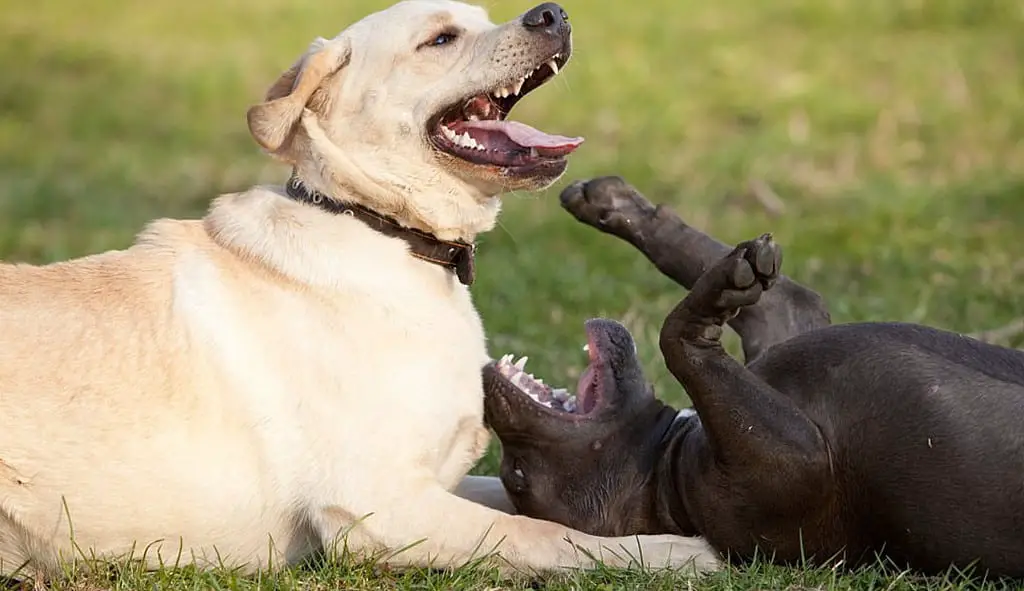Labradors are friendly dog breeds. So are labs aggressive? Well, like any other dog breed, they can display aggression under certain circumstances. It can be due to genetics, environment, training, or socialization. A Labrador dog’s aggression is rare and often results from fear or anxiety. Awareness of labradors’ aggressive nature and taking steps to prevent it is essential. Seek professional help if the situation is out of control.
Labrador Retriever Behavior
Labrador Retrievers have friendly and social temperaments. It makes them one of the most popular breeds for a dog lover. However, certain traits and factors can lead to aggressive dogs.
Labrador Retrievers are big dogs used as service animals, therapy dogs, police dogs, and guide dogs. It is due to their affable nature. They thrive in environments where they regularly interact with people and other animals. Labradors’ easygoing personalities make them great family dogs. They are ideal companions for families with small children or first-time dog owners.
Types of Aggression
Aggression is not a typical temperament feature in Labradors. Labrador retrievers are among the least aggressive breeds. American Kennel Club highly rates labrador retrievers for their kindness. However, the early experience with a lab puppy significantly contributes to their behavior. Here are a few behavioral patterns that reflect aggression in labrador retrievers.
- Dog to dog – Pack order aggression – A dog is a pack animal, and they consider the family members as its own. When one dog is fighting with other dogs, do not intervene. Instead, interrupt by using water in a spray bottle.
- Redirected aggression occurs when an aggressive dog redirects from one source to another. A dog may retaliate when the owner tries to pull him back. They may reflect dominance over subordinates like small children or other dogs.
- Gender aggression is mostly visible in male dogs over dominance and territorial conflicts. Between females, it is prominent when one female is pregnant and living with another in the same household.
- Predatorial aggression – It is reflected due to fast-moving stimuli like cars or bikes. Things that can be considered prey trigger aggressive behavior.
- Pain-induced aggression occurs upon touching a painful area or giving injections.
- Fear-induced aggression – When labrador retrievers feel they cannot escape, they reflect fear aggression. Punishments often turn labradors aggressive and fearful. Keep children away when the dog is eating. Do not tease or hurt a dog and keep them confined in front of unfamiliar people.
- Maternal aggression is visible when someone approaches a mother dog with puppies or false pregnancy.

Signs And Causes Of Aggressive Behavior In Labradors
Labradors can show aggression due to territorial or possessive tendencies. Other factors include past trauma, poor socialization, training, medical conditions, etc.
Territorial Or Possessive Behavior
Labradors are friendly but can also exhibit territorial or possessive behavior. It happens when a Labrador feels its possessions or space are threatened. If another dog tries to remove its chew toys or dog food bowl, it may respond aggressively.
One way to prevent territorial behavior is by teaching the Labrador basic commands like “leave it” or “drop it.” It helps them learn to share their belongings without becoming aggressive. Labrador owners must understand their dog’s body language. They can intervene before any aggressive behaviors escalate. Signs of possessive behavior include growling, barking, snarling, snapping, and biting.
Aggressive Behavior Towards Other Dogs Or People
Labradors can be aggressive toward other dogs or people. Poor socialization or territorial or possessive behavior can cause it. If your Labrador has not been socialized with other dogs or people, they may act aggressively.
Some Labradors may become territorial over their food, chew toys, or space, leading to aggression towards anyone approaching these items. Keep a close eye on them when handling valuable items.

Poor Socialization And Training
Lack of socialization and poor training also lead to dog aggression. The inadequately socialized lab may feel anxious around unfamiliar people, dogs, or situations. It can lead to aggression as the dog defends itself from perceived threats.
Start early training and socialization to prevent such behavior. Use rewards for good behavior to build trust with your pet. Consistency is important when training a Labrador. It allows them to learn quicker and understand positive behavior.
Provide proper exercise and mental stimulation to prevent chewing on furniture or excessive barking. Take them to a dog park to meet other dog owners and dogs.
Past Trauma Or Abuse
Past trauma or abuse can also result in aggressive animal behavior. A labrador may become a fearful dog if they have been treated badly. It could be due to a poor life experience with previous owners or traumatic events like an accident.
Owners must handle their dogs with care and avoid frightening with harsh punishment. Pet owners must identify the underlying causes of aggression before taking corrective measures.
Medical Conditions
Certain health problems could trigger aggression in Labrador dogs. Pain or discomfort caused by an injury or illness can cause your dog to become irritable and short-tempered. If you notice sudden behavioral changes, consult your veterinarian to rule out underlying health issues.
Hormonal imbalances like hypothyroidism may also lead to aggressiveness in Labradors. Symptoms include weight gain, lethargy, and hair loss. Behavioral changes like increased anxiety and aggression toward other dogs or people are also noticed.
Dangers of having aggressive Labrador Retrievers
A dog with aggressive tendencies can bite or harm humans or another dog. Such labs can be extremely destructive and threatening. A ferociously barking dog is unsuitable for an apartment. You can get reported by your neighbors.
Prevention Of Aggressive Behavior In Labradors
Some prevention methods are early socialization, positive reinforcement, professional help, and adequate exercise and mental stimulation.
Early Socialization And Training
- Begin socializing your puppy as early as possible.
- Expose your puppy to different people, animals, sounds, and environments to make them comfortable with new experiences.
- Use positive techniques to train your dog. Reward good behavior with treats or praise.
- Teach your dog basic obedience commands such as sit, stay, come, and leave it.
- Provide plenty of exercise and playtime to help burn off excess energy.
- Set clear boundaries and rules for your dog to follow.
- Seek professional help if you have any concerns about your dog’s behavior or need assistance with training.
Socializing and training your Labrador retriever is an ongoing process that requires patience, consistency, and effort. You can ensure a well-behaved and friendly dog by starting early.
Positive Reinforcement Techniques
Positive reinforcement is an effective way to encourage good behavior in Labradors. Here are some training tips for developing positive behavior patterns:
- Use treats: Offer your Labrador a treat each time they exhibit positive behavior. This will encourage them to repeat the same action in the future.
- Clicker training: This technique involves using a clicker each time your dog displays positive behavior, followed by a reward.
- Verbal praise: Use praise and encouraging words when your dog does something good, like “Good job!” or “Well done!”
- Playtime: Use playtime as a reward for good behavior, such as fetching a ball or going for a walk.
- Consistency: Consistent reinforcement ensures that your dog’s positive behavior becomes habitual.
Seeking Professional Help
A certified dog trainer or veterinary behaviorist can determine the cause and help manage or correct aggressive breeds. They may use desensitization and counter-conditioning techniques to change your dog’s response to triggers.
Seeking professional help ensures that underlying medical conditions are addressed. Your veterinarian can perform a thorough examination and recommend treatment options if necessary. Aggression in Labradors must not be taken lightly.
Seeking professional help can make a difference for you and your furry friend. It increases the safety of the family members and improves your pet’s quality of life.
Providing Adequate Exercise And Mental Stimulation
Labradors are high-energy dogs that require plenty of exercise to stay physically fit and mentally stimulated. Adequate exercise reduces aggressive behavior in Labradors. It allows them to release excess energy and frustration.
Owners should take their Labradors for daily walks in dog parks, runs, or hikes. This will provide physical activity and expose them to different environments. Mental stimulation is as important as physical exercise for Labradors. Engaging in interactive games like fetch, hide-and-seek, or puzzle toys keeps their mind active.
Dog training classes are also beneficial. They improve socialization skills, preventing aggressiveness towards other dogs and people.
Spray your limbs with a taste deterrent.
A lab puppy is the most notorious and can be a bit aggressive. If they suddenly bite your legs or the couch, spray them with a taste deterrent. The puppies will be distracted and avoid such behavior. Do it for about two weeks for maximum results.
Neuter your dog early.
High testosterone levels in male dogs make them prone to aggression. This hormone is responsible for growth in dogs. It makes lab puppies capable of gaining 55 pounds in a year. The American Kennel Club recommends fixing labs by 6 months of age. An unfixed dog will likely run away in a dog park and fight with other dogs. You can prevent labradors’ aggressive behavior by fixing them.

Tips For Nurturing Your Labrador’s Behavior And Needs
Understand your Labrador’s personality and behavior to provide the right care and training. Each dog is unique, and Labradors are no exception! Some may be more outgoing, while others prefer to be alone. Understanding your dog’s temperament will establish a stronger bond.
Labradors are friendly, but some may have dominant personalities. Recognize these traits without assuming they’re aggressive. Instead of viewing this as a problem, identify ways to address these behaviors positively.
If your Labrador wants attention, redirect it by increasing playtime or training sessions. Please do not treat it as an unwanted behavior. You and your pet will benefit from it without causing frustration or misunderstanding.
Consistency In Daily Routine
Consistency in daily routine is crucial for the well-being of Labradors. They thrive on structure and predictability, and any changes to their routine can cause them stress or anxiety.
Establish a schedule for feeding, exercise, playtime, training sessions, and sleep. Feeding should be done simultaneously daily so your Labrador knows when to expect food. Exercise routines should be consistent with balancing your dog’s energy levels.
A consistent daily routine helps your Labrador feel secure and comfortable. Taking your dog for 30-minute walks twice daily regulates their behavior positively. Over time, it will become an instinctual or automatic habit.
Maintaining A Safe Environment
Maintaining a safe environment is important to avoid potential triggers. Ensure that the area where your dog spends most of its time is free from dangerous objects or substances. Secure any gates or doors to prevent escape.
Consistently supervise interactions between children or smaller dogs with your Labrador. If your dog becomes aggressive towards strangers or other dogs, try walking them during less busy times or take other routes.
Showing Love And Affection
Love and affection are among the most important things to show your furry friends. Labradors thrive on positive interactions with their owners. Regularly cuddling, playing with toys, or walking together deepens your bond. Setting aside time daily for quality one-on-one time with your pup is crucial.
It could mean simply sitting together while watching TV or reading a book. Give them attention when they want. Take them on special outings like hikes or beach trips.
Every dog has unique preferences regarding affection. Some prefer belly rubs, while others enjoy being petted behind the ears or scratched under the chin. Pay attention to what makes your Labrador happy and adjust accordingly.

How Your Role as a Human Trainer Impacts Your Dog?
Humans play a significant role as dog owners or trainers. It significantly impacts their personality and behavior. Teach your dog what you expect them to follow. It becomes more vital in homes with many dogs. Besides having a great temperament, labrador retrievers are highly intelligent. This popular breed learns quickly and is easier to train than other pets.
Training a young puppy is better than an older dog, so start early. Establishing a routine will help your dog know what to expect. Dogs without a consistent routine can become extremely sensitive or anxious.
They may become more guarded, territorial, or upset. They may develop unpredictable responses in case of inconsistent care. You want your dog to feel safe and trust you. So, the more consistent you are, the better they adapt. They will also be less fearful or anxious as a result.
FAQ on Are Labs Aggressive
What are signs of aggression in Labs?
Signs of aggression in Labradors include growling, snarling, baring teeth, snapping, or biting. Other signs may include raised fur, tense body language, and a fixed stare. Address any aggressive behavior promptly and seek professional help if needed.
Is Labrador a good family dog?
Labrador breed is friendly and has a loving nature. It makes them an excellent choice for a family pet. They are easy to train, loyal, and social, making them great with children, pets, and family.
are black labs more aggressive than yellow labs?
There is no evidence to suggest that black Labs are more aggressive than yellow Labs. The color of a Labrador’s coat does not correlate with its behavior or temperament. Genetics, environment, and training influence a Labrador’s temperament and behavior.
Do Labs have behavior problems?
Like any dog breed, Labradors may experience behavior problems. Common behavior problems in Labradors include jumping, chewing, digging, and barking.
Is it normal for a Labrador to be aggressive?
Labradors are not typically an aggressive breed. However, like dogs, they may display aggressive behavior under certain circumstances. Proper training, socialization, and a loving environment prevent potential behavior issues.
What is bad Labrador behavior?
Bad behavior in Labradors includes jumping, chewing, digging, excessive barking, and aggression. These behaviors can be addressed through proper training, socialization, and reinforcing positive techniques.
Is a Labrador Retriever an aggressive breed?
Labrador Retriever is not an aggressive breed. They are friendly, loving, and gentle, making them great family pets. Proper training, socialization, and a loving environment will prevent behavioral issues.
Why does my Labrador become aggressive?
Labradors may display aggressive behavior due to genetics, environment, or lack of proper training. If your Labrador shows any signs of aggression, seek professional help from a dog trainer or behaviorist.
Who is more aggressive Labrador or a golden retriever?
Labrador Retrievers and Golden Retrievers have friendly and gentle natures. Neither breed is typically considered aggressive. However, like other dogs, they may display aggressive behavior under certain circumstances.
Are Labs difficult dogs?
Labradors are generally easy to train and socialize, making them an excellent choice for a family pet. They are friendly, loving, and gentle, making them great with children and other pets. Providing proper training, socialization, and a loving environment is important.
What lab is the most aggressive?
There is no evidence to suggest that any specific type of Lab (e.g., black Lab, yellow Lab, chocolate Lab) is more aggressive than others. Genetics, environment, and training influence a Labrador’s temperament and behavior.
Can Labrador be aggressive to strangers?
Labradors may behave aggressively toward strangers, like any dog, under certain circumstances. Labradors are not aggressive and are known for their friendly and loving nature.
Will a Labrador defend you?
Labradors are not known for being protective or guard dogs. They are typically friendly and gentle, making them more likely to wag their tails than protect their owners. Labradors may still act protectively if they sense a threat or danger to their owners or home.
Are Chocolate labs aggressive?
Chocolate labs are bred typically from the English line. Chocolate labs can be slightly challenging to train. However, it does not indicate an aggressive dog.
Author Profile
- Site Owner And Dog Lover
-
Aritra, the founder of Labradorandyou.com, is a lifelong dog lover whose passion ignited for Labradors for their loyalty and intelligence. With extensive research and personal experiences, Aritra has become a Labrador expert, offering a rich resource on the breed. Labradorandyou.com provides reliable, timely, and evidence-based information, including Labrador-specific product reviews, training techniques, and care tips.
Labradorandyou.com was born out of Aritra's passion and his desire to share his profound knowledge about the breed. The site serves as a comprehensive resource, offering a wealth of up-to-date information for Labrador owners and enthusiasts alike
Also by the author
-
 Lab-TypesNovember 17, 2023Old Dog Seizures: Causes, Symptoms, and Treatment Options
Lab-TypesNovember 17, 2023Old Dog Seizures: Causes, Symptoms, and Treatment Options
-
 Lab-TypesNovember 17, 2023Why Is My Dogs Poop Yellow? 8 Reasons & Solutions
Lab-TypesNovember 17, 2023Why Is My Dogs Poop Yellow? 8 Reasons & Solutions
-
 ReviewsNovember 17, 2023The Only Hill’s Science Diet Review You Need To Read
ReviewsNovember 17, 2023The Only Hill’s Science Diet Review You Need To Read
-
 Lab-TypesNovember 17, 2023How To Adopt An Emotional Support Dog?
Lab-TypesNovember 17, 2023How To Adopt An Emotional Support Dog?





